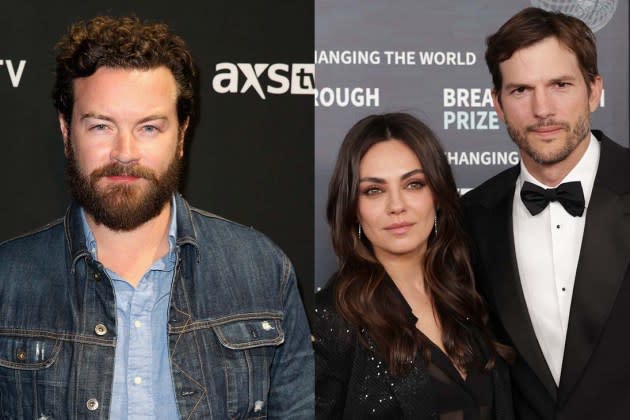After Danny Masterson Rape Conviction, ‘That ’70s Show’ Cast and Crew Asked Judge for Leniency
- Oops!Something went wrong.Please try again later.
- Oops!Something went wrong.Please try again later.
- Oops!Something went wrong.Please try again later.
- Oops!Something went wrong.Please try again later.
- Oops!Something went wrong.Please try again later.

The judge overseeing Danny Masterson’s criminal case handed the actor the maximum allowable sentence, resisting calls from nearly 50 of his family, friends and colleagues to allow him to serve his prison term concurrently rather than consecutively.
Ashton Kutcher, Mila Kunis, Kurtwood Smith, Debra Jo Rupp and David Trainer — all of whom worked alongside Masterson in That ’70s Show — wrote to the court as character references urging Los Angeles Superior Court Judge Charlaine F. Olmedo to offer Masterson leniency in letters dated between July and August, after he was convicted in May. They mostly touted his commitment to discouraging the use of drugs.
More from The Hollywood Reporter
Christina Ricci Stresses the Importance of Believing Victims: "To Discredit the Abused Is a Crime"
Despite Danny Masterson Sentencing, 'That '70s Show' Reruns Still Airing
Masterson on Thursday was sentenced to 30 years to life in prison. Though she had the choice to restrict his sentence to 15 years to life, Olmedo declined to do so.
Masterson will be eligible for parole in roughly 25 years, when he’s 72 years old.
In his letter obtained by The Hollywood Reporter, which is embedded below, Kutcher called Masterson a “role model,” with “exceptional character.” The actor, who founded an anti-human trafficking organization, explained, “I attribute not falling into the typical Hollywood life of drugs directly to Danny. Any time that we were to meet someone or interact with someone who was on drugs, or did drugs, he made it clear that that wouldn’t be a good person to be friends with.”
Kunis said that Masterson has been an “exceptional older brother figure” to her. “His dedication to avoiding all substances has inspired not only me but also countless others in our circle,” she wrote. “Danny’s steadfastness in promoting a drug-free lifestyle has been a guiding light in my journey through the entertainment world and has helped me prioritize my well-being and focus on making responsible choices.”
(Kutcher and Kunis later apologized for writing the character letters, with Kunis saying, in part, during a joint video with Kutcher, “We support victims. We have done this historically through our work and will continue to do so in the future.”)
Trainer, who directed That ’70s Show, said that Masterson was “always strictly opposed to drugs of any kind.” He detailed that the cast “made a pledge to each other, which they keep faithfully, never to do drugs.” Rupp said in her letter that “one of the first things” Masterson did as the “leader of the kids on our show” was to have “them all make a pact that no one would do drugs because of the nature of our show.”
Masterson’s use of drugs to incapacitate his accusers played a prominent role in the case. The women testified that they were offered a drink by the actor that quickly made them feel intoxicated and didn’t line up with the amount they consumed. Unlike the first trial, prosecutors were allowed to directly argue that Masterson drugged his accusers, which may have helped net them a conviction in his retrial.
None of the actors were present during Masterson’s sentencing when his accusers addressed the court of how the assaults impacted their lives. Other figures in Hollywood that wrote to the court as character references include Shawn Piller, Justin Mooney, Jim Patterson, Giovanni Ribisi, William Baldwin and Eric Balfour.
While character references can’t hurt, Los Angeles lawyer Tre Lovell, who was not involved in the case, says they are “not that helpful.” He adds, “The victim impact statements are more significant in affecting sentencing than character endorsements” and that “the number of character references, and the nature of the celebrities giving them, had no effect, as the judge gave Masterson the maximum sentence.”
During the trial, Masterson’s accusers offered graphic testimony of violent assaults at the actor’s Hollywood home in 2003. In one instance, he dragged an accuser into a jacuzzi before she passed out. She testified that she woke up on a bed to him forcing himself on her. When she fought back, Masterson choked her and brandished a gun to get her to stop resisting, she said.
“If you were a young woman, who each of these women were at the time, you were far from safe,” Deputy District Attorney Reinhold Mueller said during closing arguments in the first trial, which ended in a hung jury. “Because if you were incapacitated in his bed, he would rape you. If you were incapacitated elsewhere in the house, he would come and find you. And if you were at his home and not yet intoxicated, he would offer you the alcohol to get you there and then forcibly rape you.”
The character references — including those from police officers, business leaders and neighbors — also praised Masterson as an admirable father and friend.
Masterson’s lawyers have said the actor will appeal the conviction.
Sept. 11, 6 a.m. Updated to include Kutcher and Kunis’ video apology.
Best of The Hollywood Reporter
Best Moments of Taylor Swift's Eras Tour: Surprise Songs, Guests and More
Harvey Weinstein's "Jane Doe 1" Victim Reveals Identity: "I'm Tired of Hiding"

